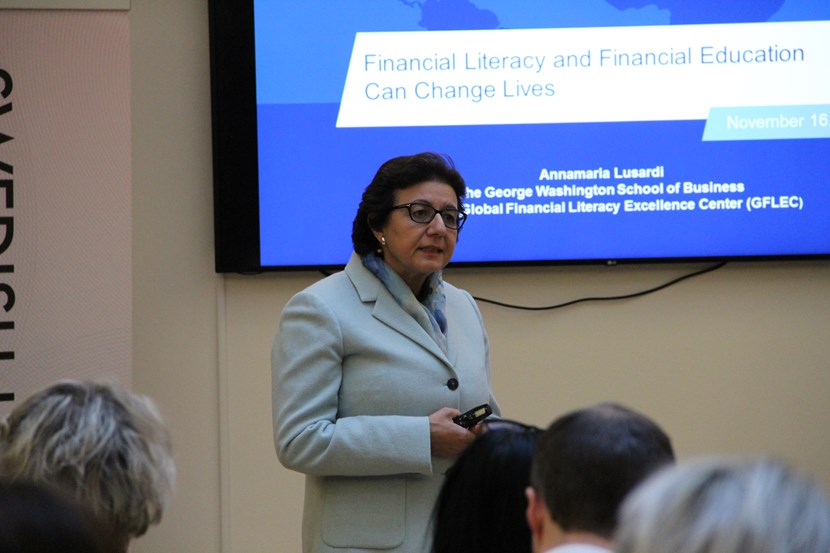Lusardi on financial literacy levels: ”We need robust interventions”
dec. 01, 2017
“We need robust interventions. Just as it was not possible to contribute to and thrive in an industrialized society without basic literacy—the ability to read and write—so it is not possible to successfully navigate today’s world without being financially literate.”, said professor Annamaria Lusardi when visiting Swedish House of Finance to share her research and receive Skandia’s 2017 research award.

The widespread financial illiteracy we see around the world needs to be addressed – and soon.
In a society where much of the financial responsibility has shifted from governments to the individual, financial knowledge is crucial. Being financially literate gives individuals the ability to make informed financial choices regarding issues such as saving, investing, and borrowing.
Annamaria Lusardi, the Denit Trust Endoweed Chair of of Economics and Accountancy at the George Washington University, has developed a simple measure of financial literacy, which has been used in many countries around the world. She has designed three questions (now known as the Big Three) that test the knowledge of three fundamental concepts: interest, inflation and risk.
Her research shows that financially literate individuals are more likely to save for retirement and are savvier investors as well.
People with low financial literacy on the other hand are more vulnerable to high debt and insolvency.
“Young people worry me in particular. Do they have the skills to do well in today’s society? A lot of decisions happen early in life. Such as whether to go to college, and how to pay for that education”, says Annamaria Lusardi.
Worldwide, only 33 per cent of the population is financially literate. In Sweden the figure is 71 per cent. Wealthy people are more financially literate than poor people, and those with high education attainment are also more financially literate. Furthermore, women have lower financial literacy than men and financial literacy is lower amongst young people.
However financial literacy is not only important to individuals, but also to the society at large. One consequence of low financial literacy is when people make poor financial decisions, tax payers might have to be asked to pay for the costs of those decisions.
“If people are not saving enough for retirement because of lack of financial literacy, society may have to to address the problem of living in poverty after retirement”, Annamaria Lusardi states.
Another link is found between financial literacy and entrepreneurship.
“If many young people are in debt because of student loans, and if they take more loans than they can understand or pay back – it becomes a hindrance for entrepreneurship. A lot of the growth in employment in the US comes from small firms, so lower entrepreneurship among the young can have a consequence for society”, says Annamaria Lusardi.
Do you think that enough is done today, in terms of financial education?
“No. The reason why I’m so passionate about this topic and I am working so much to highlight the importance of financial literacy, is that I think too little is done. We are at a crisis level when it comes to financial literacy. People are simply not equipped to make good financial decisions”, says Annamaria Lusardi.
What should be done?
“Some urgent things to be done are adding financial literacy into school curricula. It’s an essential skill that young people need in order to thrive in today’s society,. Each year that we delay adding financial literacy in schools, we are losing time.”
Professor Lusardi suggests that a national strategy for financial literacy is also needed, so that resources are spent properly and for financial education to reach vast segments of the population. Education in schools can reach the young, while adults can be reached through the work place. In her research, Lusardi has found evidence that employer-provided educational programs have positive effects on employees’ financial behavior.
“We need to articulate a strategy for financial literacy, and make sure that the financial well-being and financial security of individuals is also a component of policy. It’s very important that policy makers think of this – because what’s at stake is our future. Our future, and the future of our young.”
